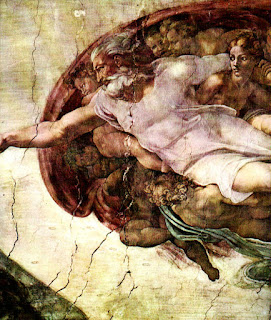We hold these truths to be self-evident, that all truth is God’s truth, that nature is endowed by its Creator with certain unalienable laws, that among these are Newton’s law of gravitation, the four laws of thermodynamics and Heisenberg’s uncertainty principle. That to observe these laws, the scientific method is instituted among men, deriving its just powers from the consent of the rational. That whenever any form of pseudo-science becomes destructive to these ends, it is the right of the Evangelical church to alter or to abolish it, and to institute proper methods of observation, laying its foundation on such principles and organizing its powers in such form, as to them shall seem most likely to effect positively their intellect and faith. Prudence, indeed, will dictate that creation doctrines long established should not be changed for light and transient causes; and accordingly all experience hath shown that the Evangelical church is more disposed to suffer, while evils are sufferable, than to right itself by abolishing the Special Creationist form of pseudo-science to which it is accustomed. But when a long train of abuses and usurpations, pursuing invariably the same object evinces an unintelligent design to reduce them under absolute doctrinal despotism, it is its right, it is its duty, to throw off such doctrine, and to provide new guards for its future security. Such has been the patient sufferance of these theistic evolutionists; and such is now the necessity which constrains them to alter their former creation doctrine. The history of the present Special Creationist movement is a history of repeated spiritual injuries and scientific usurpations, all having in direct object the establishment of an absolute doctrinal tyranny over Evangelical Christianity. To prove this, let facts be submitted to candid Evangelicals.
Special Creationists have refused their intellectual assent to natural laws, the most wholesome and necessary for scientific advancement.
They have forbidden Evangelical Christian scientists to acknowledge natural laws of immediate and pressing importance, unless “suspended” in their operation till their assent should be obtained; and when so “suspended,” they have utterly neglected to observe them.
They have refused to observe other natural laws for the accommodation of large portions of the Body of Christ, unless those people would relinquish the right of membership in their respective churches, a right inestimable to them and formidable to doctrinal tyrants only.
They have called together pseudo-scientific organizations at places unusual, uncomfortable, and distant from the depository of scientific knowledge, for the sole purpose of fatiguing Evangelical Christians into compliance with their doctrinal measures.
They have dissolved spiritual bonds repeatedly, for opposing with manly firmness their invasions on the intellectual rights of Evangelical Christians.
They have refused for a long time, after such dissolutions, to cause many non-Christians to become “elect”; whereby the observational powers, incapable of annihilation, have returned to secular scientists at large for their exercise; the Evangelical church remaining in the meantime exposed to all the dangers of invasion from within, and convulsions without.
They have endeavored to prevent the population of true science in American public schools; for that purpose obstructing the scientific method for both Christian and non-Christian students; refusing to pass others to encourage their scientific knowledge hither, and lowering the conditions of new appointments to school boards.
They have obstructed the administration of justice, by refusing their assent to recent Supreme Court rulings regarding the teaching of “creation science” in public schools.
They have made judges dependent on their will alone, for the tenure of their offices, and the amount and payment of their salaries.
They have erected a multitude of new Special Creationist-sympathetic organizations, and sent hither swarms of lawyers to harass our people, and eat out their brains.
They have kept among us, in times of scientific advancement, fallacy-laden “scientific” textbooks without the consent of our children’s parents.
They have affected to render the Evangelical church independent of and inferior to cultural and moral power.
They have combined with others to subject us to a spiritual jurisdiction foreign to our God-given intellect, and unacknowledged by the laws of nature; giving their assent to their acts of pretended science:
For quartering large quantities of deluded school board officials among us:
For protecting them, by mock trial, from punishment for any intellectual murders which they should commit on the members of the Evangelical church:
For cutting off our children with all parts of the scientific world:
For imposing pseudo-scientific doctrine on us without our consent:
For depriving us in many cases, of the benefits of using the minds God gave us:
For transporting us past the gates of so-called “orthodoxy” to be tried for pretended offenses:
For abolishing the free system of knowledge exchange in neighboring Evangelical communities, establishing therein an arbitrary church government, and enlarging its boundaries so as to render it at once an example and fit instrument for introducing the same pseudo-scientific doctrine in our churches:
For taking away our ability to think critically, abolishing our most valuable asset, and altering fundamentally the forms of our thought processes:
For suspending our own church memberships, and declaring themselves invested with power to “lord it over us” in all cases whatsoever.
They have abdicated respect here, by declaring us out of God’s favor and waging war against us.
They have plundered our schools, ravaged our courts, burned our copies of Darwin’s On the Origin of Species, and destroyed the spiritual lives of our families and friends.
They are at this time transporting large quantities of pseudo-scientific theory to complete the works of intellectual death, spiritual isolation and doctrinal tyranny, already begun with circumstances of ignorance and perfidy scarcely paralleled in the most barbarous ages, and totally unworthy the representatives of Christ.
They have constrained our fellow Evangelical Christian scientists taken captive in the laboratory to bear witness against their microscopes, to become the intellectual executioners of their friends and brethren, or to fall themselves by their hands.
They have excited academic insurrections against us, and have endeavored to bring on the inhabitants of our intellectual frontiers, the merciless secularists, whose known rule of warfare, is undistinguished destruction of all religions, sects and churches.
In every stage of these oppressions we have petitioned for redress in the most humble terms: our repeated petitions have been answered only by repeated spiritual injury. Special Creationist doctrine, the character of which is thus marked by every act which may define doctrinal tyranny, is unfit to be the doctrine of a intellectually free people.
Nor have we been wanting in attention to our Special Creationist brethren. We have warned them from time to time of attempts by their sympathetic deacons and pastors to extend an unwarrantable jurisdiction over us. We have reminded them of the circumstances of our intellectual emigration and settlement in theistic evolution. We have appealed to their native justice and magnanimity, and we have conjured them by the ties of our common spiritual bonds to disavow these usurpations, which, would inevitably interrupt our connections and correspondence. They too have been deaf to the voice of academic justice and of consanguinity. We must, therefore, acquiesce in the necessity, which denounces our separation, and hold them, as we hold the rest of Christian pseudo-scientists, enemies in intellectual war, in spiritual peace friends.
We, therefore, the theistic evolutionist representatives of the Evangelical church, in the Body of Christ, assembled, appealing to the Supreme Judge of the cosmos for the rectitude of our intentions, do, in the name, and by the authority of Jesus Christ, solemnly publish and declare, that these united Christians are, and of right ought to be free and independent intellectually; that they are absolved from all allegiance to Special Creationist doctrine, and that all theological connection between them and Special Creationism, is and ought to be totally dissolved; and that as free and independent intellectuals, they have full power to levy doctrinal war, conclude doctrinal peace, contract spiritual alliances, establish intellectual commerce, and to do all other acts and things which Christians may of right do. And for the support of this declaration, with a firm reliance on the protection of Divine Providence, we mutually pledge to each other our intellectual lives, our souls and our sacred honor.








